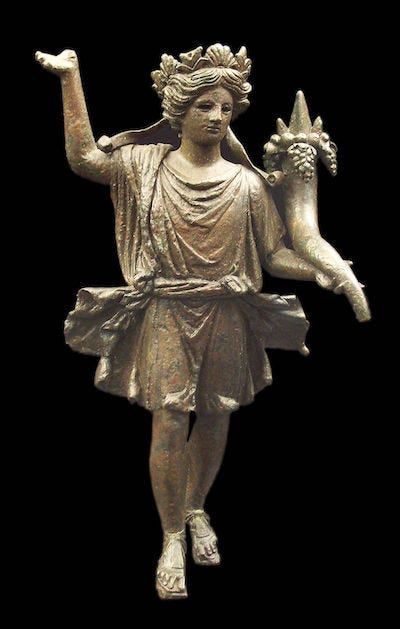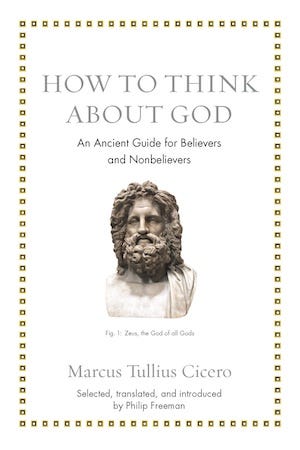[Based on How to Think about God: An Ancient Guide for Believers and Nonbelievers, by Cicero, translated by Philip Freeman. Full book series here.]
God is on everyone’s mind. Whether you are a religious person (the majority of humanity) or an atheist, God is part of your life either because you think it exists or because you are confident it doesn’t. Which is why this lean excerpt from Cicero’s On the Nature of the Gods will make for fun and simulating reading for pretty much everyone.
The original Roman religion, before Rome became a power to be reckoned with in the Mediterranean, was centered on a few interconnected elements. There were the Lares, a mix of household gods and ancestors who watched over the safety of the family. There were the Penates, the gods protecting the inner household, as implied by the name, which comes from penus, Latin for the innermost part of the house.
There was also Vesta, the goddess of the sacred hearth fire, which was to be attended to by a special cast known as the Vestal virgins. It was said that Rome would last so long as the fire of Vesta would keep burning. These and other gods, protectors of roadways and seaways, of towns and cities, of livestock and agriculture, were divine spirits representing forces of nature, and lacked statues in human form, or stories associated with them, like in the Greek myths.
Then there were state cults, like that of Jupiter, lord of the heavens. A gigantic temple dedicated to him towered over the Capitoline Hill, right above the Forum. There was Mars, god not just of war, but of agriculture as well. And one of my favorite, Bona Dea, literally the good goddess, worshipped only by women (that tells you something, no?).
Of course pretty soon Rome’s domain expanded over Italy first and the rest of the Mediterranean later. While this was happening, new gods were imported and joined the Roman pantheon, one of the many reasons Rome’s domination lasted for so long: pay taxes and don’t foment rebellion, and in exchange you can keep your gods and benefit from all that Rome could provide.
Eventually the Greek pantheon merged with the Roman one, but most Roman intellectuals were skeptical both of traditional religion and of the all-too-human stories told about Zeus/Jupiter, Mars/Ares, Venus/Aphrodites, and all the others. Indeed, cultured Romans went for one of two available alternatives: the Epicurean conception of gods, or the Stoic one.
Epicurus is often portrayed, especially by modern secular humanists, as either agnostic or atheist, yet he was definitely neither. He thought that the gods do exist, but that they spend their time doing godly things, chiefly meditating, and cannot be bothered with earthly matters. This meant that we should not be afraid of the sort of punishment after death that priests and poets love to scares us with, nor should we waste our time praying to the gods. You can see why the Christians later on were no fans of the Epicureans.
The Stoic notion, by contrast, was quite a bit more alluring. They equated God (in the singular) with Nature, identifying it as the living cosmos endowed with the logos, that is, reason. We are, then, literally bits and pieces of the cosmic organism, sharing its fate. Indeed, this is a providential God, not in the Christian sense of a God that ordains things so that they are for our (eventual) salvation, but in something like the relationship of the parts that make up a body and the body itself. Here is Epictetus making the analogy explicit:
“Consider a foot, for instance. I may think that it’s natural for a foot to be clean, but if you take it as a foot, and not in isolation, it will also be appropriate for it to step in mud or on thorns, and sometimes to be amputated for the sake of the whole. Otherwise, it isn’t a foot.” (Discourses, 2.5)
A more modern way to put it might be to say that each of us is like a cell of the cosmic organism. What happens to us may or may not be pleasant from our limited perspective, but it is necessary for the well being of the whole. Heck, we have to die, at some point, because otherwise we become like cancers, making the cosmos sick. So Stoic providence has nothing to do with a concern of God for us, but it does mean that we ought not just to endure but to positively embrace whatever happens to us, death included, because that’s our job in the cosmic scheme of things. Very comforting, if only it were true.
Let’s get back to Cicero’s book. He wrote On the Nature of the Gods (De Natura Deorum) in 45 BCE, the year before Julius Caesar’s assassination. During that period he was forced to stay away from Roman politics, as Rome had turned into a dictatorship and he had sided with the wrong party during the preceding civil war. Caesar had spared Cicero out of respect and because of their friendship (they were distant relatives and had known each other since they were young men), but he wasn’t about to allow him to meddle with his grand plan for Rome.
On the Nature of the Gods is written as a dialogue among three characters: Velleius the Epicurean, who defends the position that the gods exist but are not interested in human affairs; Balbus the Stoic, who explains the notion of a providential living cosmos; and Cotta the Academic, who is skeptical of both views and presumably articulates a position close to Cicero’s own. It’s rather unfortunate that Philip Freeman, the translator, decided to present only the Stoic view in this excerpt. It would have been wonderful for the reader to get a sense of the scope of the entire dialogue. Next time, perhaps.
How to Think about God also includes a translation of the famous Dream of Scipio, from another work by Cicero, De Re Publica, written in 51 BCE. It is a beautifully poetic description of a dream in which Scipio Aemilianus, who lived from 185 to 129 BCE (Cicero, for context, was born in 106 BCE), is taken on a grand tour of the heavens by his grandfather, the famous Scipio Africanus, the guy who defeated the Carthaginian general Hannibal at the Battle of Zama in 202 BCE.
The dream gives us an enchanting picture of the cosmology of the time, refers to the notion that the souls of virtuous people live on after death, and provides a vivid example of a Stoic meditative technique known as the view from above. More on the dream in a bit.

The following are some highlights from How to Think about God, with accompanying brief commentaries:
“Cleanthes of our Stoic tradition said there are four ways in which the nature of the gods is made known to our souls. The first, which I just now discussed, arises from the foreknowledge of future events. The second, we perceive from the abundant benefits that come to us from our temperate climate, the fertility of the Earth, and many other blessings. The third method of divine revelation is from the terror we feel in our souls from lightning, storms, downpours of rain … and what the Greeks call comets but we refer to as long-tailed stars. … The fourth and best reason Cleanthes puts forward for knowledge of the gods is the uniform and constant movement of the heavens, that is, the variety, usefulness, beauty, and order of the Sun, Moon, and all the stars. The evidence of these celestial bodies should be enough to prove they are not the result of chance. Suppose that someone enters a home or gymnasium or public square and sees that everything there is well-ordered, systematic, and organized. Wouldn’t he be able to rightly judge that this was not an accident but the result of an intelligent mind at work whose orders are obeyed?” (13-15)
This passage is remarkable for a number of reasons. First of all, it is direct and clear evidence of early Stoic theology. Cleanthes was the second scholarch of the Stoa, immediately after Zeno. And in fact Cicero also paints a very similar picture about both Zeno and Chrysippus, the third head of the school.
Second, notice the analogy between the universe and a well ordered home or gymnasium. This is strongly reminiscent of a standard argument from design put forth during the 18th century by the natural theologian William Paley, which was taken seriously enough by Darwin as to merit a response in one of the chapters of The Origin of Species. Paley famously wrote that if we walk on a beach and stumble on a watch we immediately distinguish it from, say, a rock, and begin to wonder about who made it and how. From the observation of order and design to the inference that there must be a designer who imposed the order.
That said, some of the arguments puts forth by Cleanthes must have been seen as fairly shaky even at the time. Sophisticated thinkers like Cicero were unlikely to be moved by divination (first argument, more on this immediately below), let alone by the terror triggered in people by lightening and thunder (third argument). The second and fourth points, however, which are both variations of the general argument from design, were judged to be convincing by most people for millennia, until they were challenged first by David Hume (1711-1776) and then by Darwin. Heck, had I been born in the time of Epictetus (who also uses a similar argument in Discourses I.6) I would probably had leaned that way and rejected the only other viable alternative, the Epicurean model of atoms randomly bumping into each other in the void.
“Then there is the evidence of prophecies and premonitions of things to come. These are proof that the future is being revealed, shown, portended, and foretold to humanity, thus they are called revelations, signs, portents, and predictions.” (On the Nature of the Gods, 7)
This bit actually comes before the one above, but I wanted to highlighted it here because there is no way Cicero actually believed it. We know this because the following year, 44 BCE, he wrote De Divinatione (On Divination), in which he mounted a scathing criticism of the Stoic acceptance of the possibility of reading the future, be it through the entrails of animals, the flights of birds, or astrological charts.
Indeed, De Divinatione is nowadays considered the first known treatise on what we call pseudoscience, and my colleague Damian Fernandez-Beanato has published a paper in which he identifies and discusses a number of criteria for the separation of science from pseudoscience that are used by modern philosophers and that can be found explicitly in Cicero. Absolutely remarkable, and one more reason it is regrettable that How to Think about God does not include the skeptical response by Cotta.

“Now, it is certain that there is nothing greater than the universe. Not only is there nothing superior and more beautiful, but we can’t even conceive of anything beyond it. Therefore, if there is no human quality better than reason or wisdom, it must also exist in that which we have agreed is the grandest thing of all. … Thus it follows that the universe is God.” (On the Nature of the Gods, 18, 21)
Here is an explicit argument for why the Stoics believed that the universe itself is endowed with reason. It depends on some questionable assumptions, though.
Even if we agree that reason is the best of all human qualities, it doesn’t follow at all that the universe has to have it because there is nothing greater than the cosmos, and something greater cannot possibly lack a property of something less great (i.e., humans). The cosmos, we would argue today, is capable of reason only in the trivial sense that, in the course of evolution, and probably quite by accident, it has generated creatures endowed with that capacity (i.e., us). That’s it. No inference from that fact can logically be made to yield the conclusion that the universe itself is intelligent. Indeed, our best understanding from modern science is that the universe is a dynamical set of processes regulated by what, for lack of a better term, we call laws of nature. No life and no intelligence, except in tiny and likely sporadic local pockets.
“There is therefore an element that holds the whole universe together and protects it—an element not without sensation and reason. For every element in nature—provided it is not solitary and simple but instead complex and joined with other parts—must have within it some ruling principle. In human beings this principle is the mind, while in animals it is something similar to the mind which awakens their desire for things. In trees and plants which grow from the earth, this ruling principle is thought to reside in their roots. In Latin I use the term principatus for this, whereas in Greek it is hegemonikon.” (On the Nature of the Gods, 29)
Sometimes I hear self-professed “traditional” Stoics arguing that there is no evidence that the Stoics thought the universe was endowed with reason in the human sense of the word. Well, here is one very obvious bit of evidence, and it isn’t the only one! The word hegemonikon is the very same one that Marcus Aurelius uses throughout the Meditations to indicate our “ruling faculty,” which is the seat of what Epictetus calls prohairesis, our volition, or faculty of judgment. The passage above explicitly says that the universe is characterized by its own hegemonikon. I rest my case.
“The Earth itself seemed small to me now, so that I was ashamed of our empire that was little more than a point on it.” (Dream of Scipio, 16)
This last passage is from the Dream of Scipio, and is an example of the so-called view from above, a type of Stoic meditation that Marcus Aurelius often invokes. It has analogs in modern cognitive behavioral therapy and aims at helping us to put things in perspective. By expanding our vista so that we can contemplate a broader set of places, times, and circumstances, we achieve a state of equanimity toward our own, parochial, place, time, and circumstances.
A beautiful secular, science informed rendition of the same concept is found in astronomer Carl Sagan’s famous “Pale Blue Dot”:
[Next in this series: How to Give with Seneca. Previous installments: I, II, III, IV, V, VI, VII, VIII, IX, X, XI, XII, XIII, XIV, XV, XVI, XVII.]





You would have enjoyed our recent event On the Nature of the Gods (https://classicalwisdom.substack.com/p/on-the-nature-of-the-gods-cicero) - we featured the new translation by Quintus Curtius, so it was with him and Michael Fontaine. I'd be curious to hear what you think of it!
Interesting; always liked Cicero’s writings-however, personally, I don’t think about God any more than the Easter bunny, Tooth Fairy, or Santa.🤷♂️